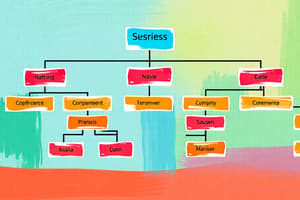Podcast
Questions and Answers
What is a primary function of management that involves setting objectives?
What is a primary function of management that involves setting objectives?
- Controlling
- Planning (correct)
- Leading
- Organizing
Which of the following best describes a characteristic of functional management?
Which of the following best describes a characteristic of functional management?
- Decentralized decision-making
- Hierarchical structure with specialized focus (correct)
- Emphasis on cross-departmental tasks
- Fluid roles with minimal supervision
What challenge does functional management often face due to its structure?
What challenge does functional management often face due to its structure?
- Overlapping responsibilities between departments
- Silo effect hindering collaboration (correct)
- Lack of expertise in specific areas
- Excessive managing of resources
Which functional area is primarily responsible for budget management and financial reporting?
Which functional area is primarily responsible for budget management and financial reporting?
What management style is characterized by centralized decision-making?
What management style is characterized by centralized decision-making?
Which benefit of functional management relates to streamlined processes leading to improved productivity?
Which benefit of functional management relates to streamlined processes leading to improved productivity?
What is a recommended best practice to combat the silo effect in functional management?
What is a recommended best practice to combat the silo effect in functional management?
Which of the following is a common misconception about the role of functional managers?
Which of the following is a common misconception about the role of functional managers?
Flashcards are hidden until you start studying
Study Notes
Definition
- Functional management refers to the administration of specific functions within an organization.
- It involves overseeing the operations, resources, and processes related to particular departments or functions.
Key Functions of Management
-
Planning
- Setting objectives and determining a course of action for achieving them.
-
Organizing
- Arranging resources and tasks to implement the plan.
-
Leading
- Directing and motivating staff to meet the organization's objectives.
-
Controlling
- Monitoring performance and making adjustments to stay on track.
Characteristics
- Specialized Focus: Each manager oversees a specific function (e.g., marketing, finance, operations).
- Hierarchical Structure: Often involves multiple levels of management, with a clear chain of command.
- Expertise Required: Managers typically possess specific skills and knowledge relevant to their functional area.
Benefits
- Increased Efficiency: Streamlined processes within departments lead to improved productivity.
- Enhanced Expertise: Functional managers develop deep knowledge in their area, leading to better decision-making.
- Clear Accountability: Responsibilities are well-defined, making it easier to track performance.
Challenges
- Silo Effect: Departments may become isolated, hindering cross-functional collaboration.
- Resistance to Change: Functional managers may resist changes that affect their area of control.
- Short-term Focus: May prioritize departmental goals over organizational objectives.
Examples of Functional Areas
- Human Resources: Recruitment, training, employee relations.
- Finance: Budgeting, investments, financial reporting.
- Marketing: Market research, advertising, sales strategies.
- Operations: Production management, supply chain, quality control.
Management Styles
- Autocratic: Centralized decision-making by the functional manager.
- Democratic: Involves team input in decision-making processes.
- Laissez-faire: Minimal managerial intervention, allowing teams to operate independently.
Best Practices
- Foster Interdepartmental Communication: Encourage collaboration to mitigate the silo effect.
- Set Clear Goals: Align departmental objectives with overall organizational strategy.
- Continuous Improvement: Implement training and development programs to enhance skills within functional areas.
Definition
- Functional management involves overseeing specific functions within an organization.
- Focuses on the operations, resources, and processes of individual departments.
Key Functions of Management
- Planning: Establishing objectives and outlining actions necessary to achieve them.
- Organizing: Allocating resources and arranging tasks for effective plan implementation.
- Leading: Inspiring and guiding staff to align with organizational goals.
- Controlling: Assessing performance and adjusting strategies to ensure objectives are met.
Characteristics
- Specialized Focus: Managers concentrate on specific functions such as marketing or finance.
- Hierarchical Structure: Features multiple management levels with an established chain of command.
- Expertise Required: Managers are equipped with specialized knowledge pertinent to their functional area.
Benefits
- Increased Efficiency: Streamlined departmental processes enhance overall productivity.
- Enhanced Expertise: Managers gain deep insights into their fields, improving their decision-making.
- Clear Accountability: Defined responsibilities help in tracking and evaluating performance effectively.
Challenges
- Silo Effect: Departments can become isolated, leading to poor cross-functional communication.
- Resistance to Change: Managers may oppose changes impacting their domain of responsibility.
- Short-term Focus: There is a tendency to prioritize departmental objectives at the expense of broader organizational aims.
Examples of Functional Areas
- Human Resources: Focus on recruitment, employee training, and relations.
- Finance: Involves budgeting, investment strategies, and financial reporting.
- Marketing: Centers around market research, advertising campaigns, and sales tactics.
- Operations: Deals with production management, supply chain efficiency, and quality assurance.
Management Styles
- Autocratic: Decision-making is centralized with the functional manager.
- Democratic: Team input is considered during decision-making processes.
- Laissez-faire: Managers provide minimal direct oversight, allowing teams independence.
Best Practices
- Foster Interdepartmental Communication: Promote collaboration to counteract the silo effect.
- Set Clear Goals: Align departmental objectives with the overall strategy of the organization.
- Continuous Improvement: Invest in training and development to enhance skills across functional areas.
Studying That Suits You
Use AI to generate personalized quizzes and flashcards to suit your learning preferences.




